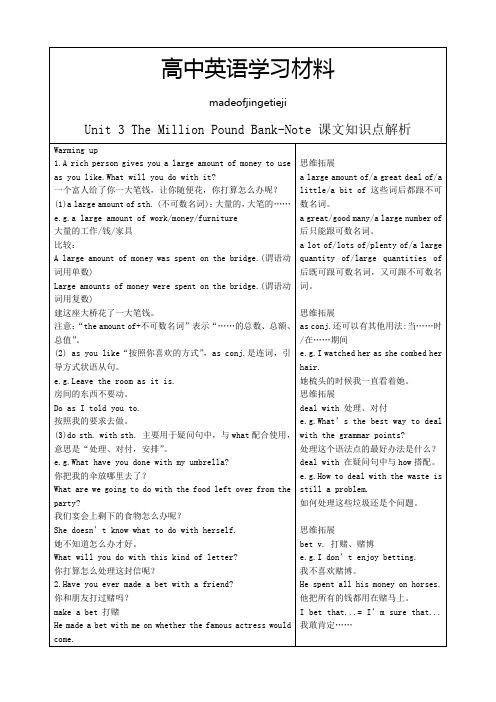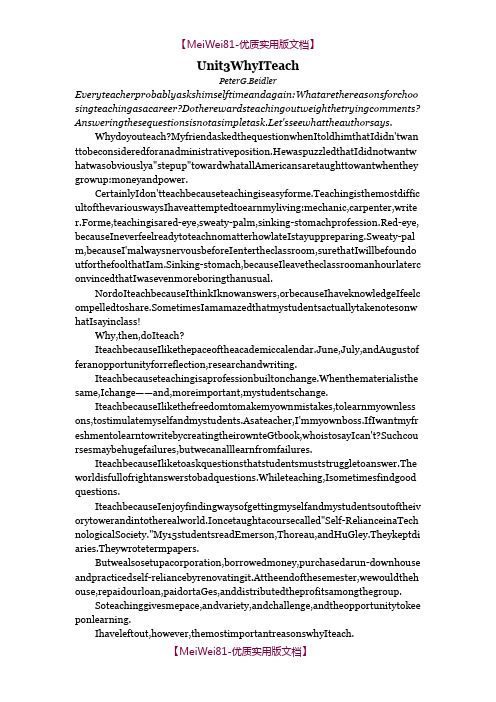unit 3 课文讲解
- 格式:ppt
- 大小:1.23 MB
- 文档页数:55



小学英语人教PEP版三年级上册Unit 3课文+知识点讲解+单词(视频+音频)Let's play!我们玩吧!How are you?你好吗?I'm fine,thank you.我很好,谢谢你。
OK.好的。
Look at my nose!看我的鼻子!How are you?你好吗?Very well,thanks.很好,谢谢。
Let's talk部分翻译Bird:Good morning.鸟:早上好。
Chen Jie:Good morning.陈杰:早上好。
Mike:How are you?迈克:你好吗?Chen Jie:I'm fine,thank you. Let's go to school!陈杰:我很好,谢谢你。
我们一起上学吧!Mike:OK!迈克:好的!Let's play部分翻译Hello! Hello!你好!你好!How are you?你好吗?Hello! Hello! Hello! Hello! How are you? How are you?你好!你好!你好!你好!你好吗?你好吗?I'm fine.Thank you. I'm fine.Thank you.我很好,谢谢你。
我很好,谢谢你。
How are you? How are you?你好吗?你好吗?Let's learn部分翻译Look at me! This is my face.看我!这是我的脸。
ear耳朵eye眼睛nose鼻子 mouth嘴 face脸Let's do部分翻译Close your eyes.闭上你的眼睛。
Open your mouth.张开你的嘴。
Touch your nose.摸摸你的鼻子。
Touch your ear.摸摸你的耳朵。
Touch your face.摸摸你的脸。
Letters and sounds部分翻译Listen,repeat and chant.egg蛋face脸hand手hi嗨elephant大象foot脚ice cream冰淇淋green绿色的gift礼物ice冰A-B-C.Clap your knee.A-B-C。

外研版七年级上册新教材(讲义)Unit 3 Family ties重点短语the meaning of family 家庭的意义communicate with 与…联系each other 互相by the end of 到…为止make a photo album 制作相册be able to 能talk about 讨论family moment 家庭时刻each person 每个人stand for 代表on the right 在右边answer the question 回答问题an older man 年长的男人a strict face 严肃的面孔a touching story 一个感人的故事be absent from 缺席take over 接管along the way 随着时间的推移turn to 向…求助in order to do 为了做solve problems 解题Chinese saying 汉语语句give advice 劝告advise - advice (不可数) 建议v.-建议n.(不可数)suggest - suggestion(s)建议v.-建议n. (s) family relationship 家庭关系dress up 打扮the school ride bike 学校骑自行车be close to 接近a serious disease 严重的疾病not....at all 根本没有...have to 不得不has to 不得不at home 在家every day 每天start to do 开始做某事across the cold river 穿过冰冷的河流run down 撞倒grow - growth 生长生长give sth. to sb. 给某人某物look for 寻找Actions speak louder than words.事实胜于雄辩。


七年级上册英语第三单元课文讲解一、课文内容概述在七年级上册英语的第三单元中,我们将学习有关描述旅行计划的课文。
这篇课文主要围绕着一个学生的旅行计划展开,内容涉及到旅行地点的选择、交通工具的安排、以及必备物品的准备等方面。
二、深度解析1. 旅行地点的选择在课文中,学生提到了他对不同旅行地点的喜好和犹豫。
这启发我们思考如何选择旅行地点,如何权衡不同地点的优缺点。
我们也可以引导学生讨论不同地点的文化特色和历史背景,从而扩展他们的视野。
2. 交通工具的安排课文中提到了学生考虑了飞机和火车这两种交通工具。
我们可以借此机会向学生介绍不同交通工具的特点和优劣势,引导他们分析在不同情况下应选择何种交通工具,以及如何预订和购票等实际问题。
3. 必备物品的准备另课文中还涉及到了旅行中要准备的必备物品,如雨伞、相机等。
我们可以借此机会向学生介绍旅行中常用的英语词汇和表达方式,让他们在实际生活中能够更好地应对各种场景。
三、总结与回顾通过这篇课文的学习,我们可以看到学生的英语能力得到了全面的锻炼。
在阅读理解方面,学生可以通过课文理解作者的意图,理解旅行计划中的具体细节。
在语言运用方面,学生可以通过课文学习到丰富的词汇和表达方式。
我的个人观点和理解我认为这篇课文很好地贴近了学生的实际生活,让他们在轻松愉快的阅读中学习到了很多实用的知识和技能。
通过对不同旅行地点、交通工具和必备物品的讨论,学生不仅能提高英语阅读理解能力,还能了解到不同文化背景下人们的生活方式和需求,从而培养跨文化交流的能力。
在未来的教学中,我将结合这篇课文,设计更多的教学活动和练习题目,帮助学生进一步巩固和拓展所学知识,提高他们的英语能力。
以上就是我对七年级上册英语第三单元课文的深度解析和个人观点,希望能够对你有所帮助。
在接下来的课堂教学中,我计划利用多种教学方法,帮助学生更好地理解和掌握这篇课文。
我会采用分组讨论的形式,让学生就课文中涉及的旅行地点、交通工具和必备物品展开讨论,并提出自己的看法和建议。

课文名称:Unit 3 2D1. 课文主题概述本节课的主题是关于介绍一位名叫Sam的男孩在周末的活动。
Sam 在周六早上骑自行车去了动物园,看了很多有趣的动物。
他和朋友们一起去了游泳池,在那里度过了愉快的一天。
周日,他则和家人一起去了爷爷奶奶的农场,体验了乡村生活。
2. 课文内容详解第一部分Sam在周六早上骑自行车去了动物园。
他看到了giraffe、elephant、penguin和monkey。
他认为giraffe很高,elephant很大,penguin很可爱,monkey很有趣。
第二部分他去了游泳池。
他学会了跳水,还和朋友们一起玩了很多游戏。
他玩得非常开心。
第三部分周日,他和家人一起去了爷爷奶奶的农场。
他们给小鸡喂食,喂牛喝水,还摘了水果。
Sam觉得这些农村活动很有意思,与城市生活截然不同。
3. 课文分析本篇课文主要通过描述Sam在周末的活动,展现了一位普通孩子在假期里的快乐生活。
课文用词简单易懂,生动形象地描绘了动物园和游泳池的特色,以及农场的农村风光。
通过这些描述,学生可以了解关于动物、游泳、农场的词汇,同时也能了解到不同活动带来的快乐和收获。
4. 课文教学目标通过本节课的学习,学生将能够:- 掌握与动物园、游泳池、农场相关的词汇;- 了解和运用描述动物和活动的形容词;- 理解并复述Sam在周末的活动过程;- 通过听、说、读、写等多种方式,灵活运用所学语言表达自己的周末活动。
5. 课文教学过程第一步:导入新课,引出本节课的主题和课文内容。
可以通过展示图片或视瓶介绍动物园、游泳池、农场的生动场景,激发学生学习的兴趣。
第二步:教师带领学生一起朗读课文,重点讲解生词和短语,并结合图片或实物进行示范。
第三步:分组或小组活动,让学生用自己的语言复述课文内容,加深对所学知识的理解和运用。
第四步:布置课后作业,鼓励学生根据课文中的内容,写一篇关于自己周末活动的短文,并在下节课上进行共享和讨论。
6. 课文教学重点和难点本课的教学重点是让学生掌握与动物园、游泳池、农场相关的词汇和短语,能够复述课文内容并进行相关活动的表达;教学难点在于引导学生用简单的句子描述周末活动,提高他们的口语表达能力。


七年级上册英语Unit 3课文详解介绍家庭成员This is my family. My father is a doctor. My mother is a teacher. I have a brother and a sister. My brother is a police officer. My sister is a nurse.这是我的家庭。
我的父亲是一名医生,母亲是一名教师。
我有一个哥哥和一个妹妹。
我的哥哥是一名警察,妹妹是一名护士。
询问和描述年龄How old are you? I am 12 years old. My sister is 7 years old. My brother is 9 years old. My parents are 50 years old.你多大了?我12岁了。
我妹妹7岁了。
我哥哥9岁了。
我父母50岁了。
表达个人喜好My favorite color is blue. I like playing soccer and I am good at it. My sister likes drawing pictures. She is very talented at it. My brother likes playing basketball and he is very good at it.我最喜欢的颜色是蓝色。
我喜欢踢足球,而且我在这方面很擅长。
我妹妹喜欢画画,她在这方面很有天赋。
我哥哥喜欢打篮球,而且他在这方面很厉害。
讨论日常活动I usually get up at 7 o'clock in the morning and have breakfast at 7:30. I go to school at 8 o'clock and have lunch at 12 o'clock. I come home from school at 5 o'clock and have dinner at 6 o'clock. In the evening, I do my homework and then watch TV. I go to bed at 10 o'clock.我通常早上7点起床,7点半吃早饭。

1杨磊译注必修三Unit 3 课文详解必修三 Unit 3 The Million Pound Band Note百万英镑Act I, Scene 3Narrator: It is the summer of 1903.Two old and wealthy brothers, Roderick 年的夏天。
这是1903and Oliver, have made a bet.两个年迈而富有的兄弟:罗德里克和奥利弗,进行打赌。
【注释:make a betOliver believes that with a 】。
我擅长打足彩football 310.310eg. I'm good at making a bet on 打赌million pound bank note a man could survive a month in London.奥利弗认为一个拥有一百万英镑支票的人能在伦敦生存一个月。
【注释:survive vi.幸存, 活下来eg. These plants cannot survive in very coldHis brother Roderick doubts it. At this他的哥哥对此怀疑。
conditions.这些植物在严寒中不能存活。
】moment, they see a penniless yound man wandering on the pavement outside their house.就在这时,他们看见一位身无分文的年轻人正在他家外的人行道上徘徊。
【注释:on the pavement徘徊街头,没有住处,被遗弃;wandering adj. 漫游的;闲逛的;(精神)恍惚的;错乱的eg. 1) wandering thoughts 错It is Henry Adams,】2) I felt my attention wandering during the lecture.我感到听讲座时老走神。


Unit3WhyITeachPeterG.Beidler Everyteacherprobablyaskshimselftimeandagain:Whatarethereasonsforchoo singteachingasacareer?Dotherewardsteachingoutweighthetryingcomments? Answeringthesequestionsisnotasimpletask.Let'sseewhattheauthorsays.Whydoyouteach?MyfriendaskedthequestionwhenItoldhimthatIdidn'twan ttobeconsideredforanadministrativeposition.HewaspuzzledthatIdidnotwantw hatwasobviouslya"stepup"towardwhatallAmericansaretaughttowantwhenthey growup:moneyandpower.CertainlyIdon'tteachbecauseteachingiseasyforme.Teachingisthemostdiffic ultofthevariouswaysIhaveattemptedtoearnmyliving:mechanic,carpenter,write r.Forme,teachingisared-eye,sweaty-palm,sinking-stomachprofession.Red-eye, becauseIneverfeelreadytoteachnomatterhowlateIstayuppreparing.Sweaty-pal m,becauseI'malwaysnervousbeforeIentertheclassroom,surethatIwillbefoundo utforthefoolthatIam.Sinking-stomach,becauseIleavetheclassroomanhourlaterc onvincedthatIwasevenmoreboringthanusual.NordoIteachbecauseIthinkIknowanswers,orbecauseIhaveknowledgeIfeelc ompelledtoshare.SometimesIamamazedthatmystudentsactuallytakenotesonw hatIsayinclass!Why,then,doIteach?IteachbecauseIlikethepaceoftheacademiccalendar.June,July,andAugustof feranopportunityforreflection,researchandwriting.Iteachbecauseteachingisaprofessionbuiltonchange.Whenthematerialisthe same,Ichange——and,moreimportant,mystudentschange.IteachbecauseIlikethefreedomtomakemyownmistakes,tolearnmyownless ons,tostimulatemyselfandmystudents.Asateacher,I'mmyownboss.IfIwantmyfr eshmentolearntowritebycreatingtheirownteGtbook,whoistosayIcan't?Suchcou rsesmaybehugefailures,butwecanalllearnfromfailures.IteachbecauseIliketoaskquestionsthatstudentsmuststruggletoanswer.The worldisfullofrightanswerstobadquestions.Whileteaching,Isometimesfindgood questions.IteachbecauseIenjoyfindingwaysofgettingmyselfandmystudentsoutoftheiv orytowerandintotherealworld.Ioncetaughtacoursecalled"Self-RelianceinaTech nologicalSociety."My15studentsreadEmerson,Thoreau,andHuGley.Theykeptdi aries.Theywrotetermpapers.Butwealsosetupacorporation,borrowedmoney,purchasedarun-downhouse andpracticedself-reliancebyrenovatingit.Attheendofthesemester,wewouldtheh ouse,repaidourloan,paidortaGes,anddistributedtheprofitsamongthegroup.Soteachinggivesmepace,andvariety,andchallenge,andtheopportunitytokee ponlearning.Ihaveleftout,however,themostimportantreasonswhyIteach.OneisVicky.Myfirstdoctoralstudent,Vickywasanenergeticstudentwholabor edatherdissertationonalittle-known14thcenturypoet.Shewrotearticlesandsentt hemofftolearnedjournals.Shediditallherself,withanoccasionalnudgefromme.B utIwastherewhenshefinishedherdissertation,learnedthatherarticleswereaccept ed,gotajobandwonafellowshiptoHarvardworkingonabookdevelopingideasshe' dfirsthadasmystudent.AnotherreasonisGeorge,whostartedasanengineeringstudent,thenswitched toEnglishbecausehedecidedhelikedpeoplebetterthanthings.ThereisJeanne,wholeftcollege,butwasbroughtbackbyherclassmatesbecaus etheywantedhertoseetheendoftheself-reliancehouseproject.Iwasherewhenshec ameback.Iwastherewhenshetoldmethatshelaterbecameinterestedintheurbanp oorandwentontobecomeacivilrightslawyer.ThereisJacqui,acleaningwomanwhoknowsmorebyintuitionthanmostofusl earnbyanalysis.Jacquihasdecidedtofinishhighschoolandgotocollege.ThesearetherealreasonsIteach,thesepeoplewhogrowandchangeinfrontofm e.Beingateacherisbeingpresentatthecreation,whentheclaybeginstobreathe.A"promotion"outofteachingwouldgivememoneyandpower.ButIhavemone y.IgetpaidtodowhatIenjoy:reading,talkingwithpeople,andaskingquestionlike," Whatisthepointofbeingrich?"AndIhavepower.Ihavethepowertonudge,tofansparks,tosuggestbooks,topoi ntoutapathway.Whatotherpowermatters?Butteachingofferssomethingbesidesmoneyandpower:itofferslove.Notonlyt heloveoflearningandofbooksandideas,butalsothelovethatateacherfeelsforthatr arestudentwhowalksintoateacher'slifeandbeginstobreathe.Perhapsloveisthewr ongword:magicmightbebetter.Iteachbecause,beingaroundpeoplewhoarebeginningtobreathe,Ioccasionall yfindmyselfcatchingmybreathwiththem.我为何教书你为什么教书呢?当我告诉我的朋友我不想做任何行政职务时,他向我提出了这个问题。

七年级上册英语第三单元课文讲解
七年级上册英语第三单元的课文讲解是关于"Unit 3 My Friends"。
这个单元主要介绍了一位新同学的自我介绍和谈论
朋友的话题。
以下是这个单元的几篇课文及其讲解:
1. Lesson 1: Introducing Helen
这篇课文是一位新同学Helen的自我介绍。
她具体介绍了自己
的名字、年龄、家庭成员和兴趣爱好等。
这篇课文的目的是让学生学会用简单的句子介绍自己。
2. Lesson 2: My Best Friend
这篇课文讲述了一个学生Tony的最好朋友Daniel。
Tony介绍
了Daniel长什么样子、有什么特点以及他们一起做了些什么。
这篇课文的目标是让学生学会用英语描述自己的朋友和朋友间的活动。
3. Lesson 3: Friends Around the World
这篇课文介绍了一些来自不同国家的学生,让学生了解到世界上有不同种族和文化的人。
通过这篇课文,学生可以了解到不同国家的人们在生活中的一些不同点。
4. Lesson 4: My Favorite Day
这篇课文讲述了一个学生Sandy在学校里最喜欢的一天,包括上课内容和和朋友一起做的活动。
通过这篇课文,学生可以学会用英语描述自己最喜欢的一天的活动。
以上是七年级上册英语第三单元的几篇课文及其简要讲解。
这
些课文旨在帮助学生学会用简单的句子介绍自己、描述朋友的外貌特点、描述朋友间的活动,以及了解到不同国家的人们的生活习惯和文化差异。

Unit3 Could you please clean your room?Section A1.Peter ,could you please take out the trash? 彼得,你能把垃圾倒了吗?【解析1】Could you please do sth ?请你(做)......好吗?用于提出请求,希望得到对方的肯定回答,说话的语气比较客气委婉。
Could 不是can的过去式,是委婉、礼貌的说法。
回答用can.【常用答语】肯定回答:Sure./ Of course./ Certainly./No problem.否定回答:Sorry , I can’t 【解析2】take out 取出(v+ adv)【注】: 跟代词做宾语,代词放中间;跟名词做宾语,可放在中间,也可放在后边【短语】take out the trash 倒垃圾take a walk 散步take away 拿走,取走take back 收回take place 发生take off 脱下;起飞The gift is in the box. You can take it out.2. Can you do the dishes.?那你可以洗盘子吗?do the dishes 洗碗【结构1】do the +名词:do the dishes/ laundry 洗餐具/衣服【结构2】do the +动词-ing do the cleaning 打扫卫生【结构3】do one’s + 名词do one’s housework/ homework 做家务/家庭作业【结构4】do some +动词-ing do some reading/ shopping 读写书/购物3.Could I at least finish watching this show? 至少让我看完这个节目可以吗?【解析1】Could I do a sth? 我可以做......吗?用于表达请求,语气比较委婉。
